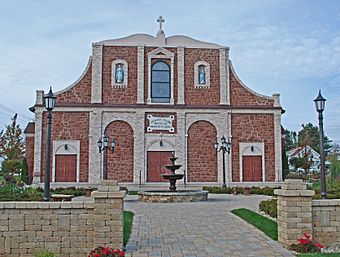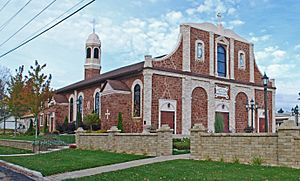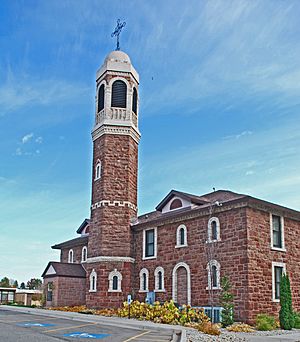Immaculate Conception Church (Iron Mountain, Michigan) facts for kids
|
Immaculate Conception Church
|
|
 |
|
| Location | 500 E. Blaine St., Iron Mountain, Michigan |
|---|---|
| Area | 1 acre (0.40 ha) |
| Built | 1902 |
| Architect | Fr. Giovanni Sinopoli di Giunta |
| Architectural style | Renaissance Revival architecture |
| NRHP reference No. | 90000562 |
Quick facts for kids Significant dates |
|
| Added to NRHP | April 05, 1990 |
The Immaculate Conception Church is a beautiful Catholic church located at 500 E. Blaine Street in Iron Mountain, Michigan, USA. It was designed in a special style called Italian Renaissance Revival. This style makes it look like grand buildings from the Renaissance period in Italy.
The church is an important historical place. It was named a Michigan State Historic Site in 1979. Later, in 1990, it was added to the National Register of Historic Places. This means it's recognized as a significant building for its history and architecture. It is also known as Mary Immaculate of Lourdes Church.
Contents
History of the Church
In the late 1800s, many Italian families moved to Iron Mountain. They came to work in the iron mines nearby. These Italian Catholics first went to St. Joseph's Church in the city center.
However, in 1890, the Italian families living on the north side of Iron Mountain decided to start their own church. They got permission to create their own parish, which is a church community. That same year, they built a wooden church building. It was located close to where the current church stands today. A priest was then assigned to lead their new parish.
Sadly, the original wooden church burned down in 1893. But the community quickly started working on a new one.
Building the New Church
In April 1902, Father Giovanni Sinopoli di Giunta arrived in Iron Mountain. He became the new priest for the parish. Father Sinopoli was a former count from Sicily, Italy. He gave up his noble title to help Italian immigrants in the United States.
The new priest quickly organized a group to raise money for a new church. He even drew up the plans for the building himself! People donated money, and they quickly raised almost $4,000. In June 1902, Father Sinopoli started digging the foundation for the church himself.
The cornerstone, a special stone laid at the start of construction, was placed in July. Building the church went very quickly. Father Sinopoli was like the engineer, architect, and construction manager all in one. Many men from the church community volunteered their time and hard work.
E.F. Brown, who was in charge of the local Pewabic Mine, also helped a lot. He donated wood for the building. He even sent workers from the mine to help, paying their salaries himself. The church was finished in December 1902. On January 1, 1903, it was officially dedicated to Mary Immaculate of Lourdes.
Growth and Changes Over Time
Father Sinopoli stayed with the church for only one year. But he left behind a well-organized church with a beautiful new building. Over the years, more improvements and additions were made.
In 1923, a rectory was built. A rectory is a house where the priest lives. In 1942, the church started catechism classes. These classes teach about the Catholic faith. These classes grew into year-round education programs.
In 1955, the parish opened its own school. This school taught children from first to eighth grade. Two famous people, Tom Izzo and Steve Mariucci, both attended the Immaculate Conception school in first grade. Tom Izzo later became a very successful college basketball coach. Steve Mariucci became a well-known football coach.
In 1971, the Immaculate Conception school joined with other Catholic schools nearby. It then housed students from first to third grades. By 1990, the schools combined even more. All classes were then taught at a different location downtown. The former Immaculate Conception school building was then rented out to the Iron Mountain school district.
The church building itself also received updates. Major improvements were made in the 1960s. The outside of the church was repaired in the 1980s. As mentioned before, the church was recognized as a Michigan State Historic Site in 1979. It was then listed on the National Register of Historic Places in 1990.
What the Church Looks Like
The Immaculate Conception Church looks a lot like old Renaissance churches you might see in Italy. This design honors the Italian families who built it. It's a rectangular church with a main open space inside called a nave. It is built from sandstone blocks that are put together in a natural, uneven way.
The main part of the church has a roof that slopes down on two sides, like a triangle. This is called a gable-end pitched roof. At the back, there's a two-story section with a hipped roof, which slopes down on all four sides.
A very noticeable feature is the tall, eight-sided bell tower. It looks like a campanile, which is a type of bell tower often found in Italy. At the top, it has a belfry with openings where the bells are.
Inside, the ceiling is shaped like a half-cylinder, called a barrel-vaulted ceiling. It's supported by unusual wooden trusses, which are strong support beams. Beautiful stained glass windows let light into the nave. At least three of these windows were made by the Menominee Stained Glass Works. These windows are set into arched openings made of brick.
The front of the church, called the facade, is very impressive. It has two decorative arches that don't actually open, called blind arches. These arches are framed by flat, decorative columns called pilasters. These pilasters make the front look grand. The main entrance is in the center. Shorter sections on each side of the main facade are connected by curved walls. These walls hide the triangular shape of the roof behind them. There are also two special spots, called niches, that hold statues of saints.




